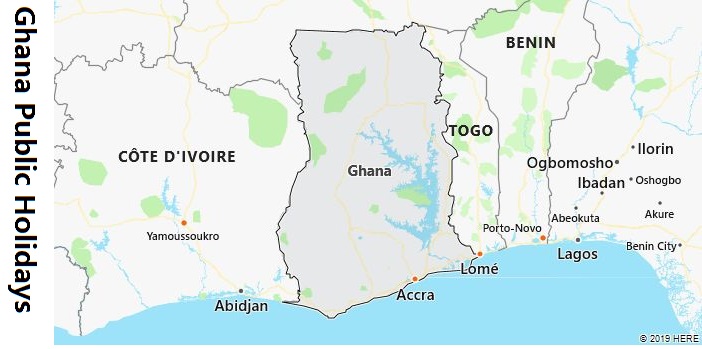Ghana Holidays
Ghana Public Holidays
Searching for the national holidays in Ghana? All public holidays in Ghana are treated like Sundays. This means that most of the Ghana employees have a day off and all schools are closed on these office holidays. If you are planning a trip to Ghana and want to know what the national and regional holidays are, check the details in the tables below.
List of Official Holidays in Ghana for Year 2020
| # | Date | Holiday | Day |
| 1 | January 01, 2020 | New Year’s Day | Wednesday |
| 2 | January 07, 2020 | Constitution Day | Tuesday |
| 3 | March 06, 2020 | Independence Day | Friday |
| 4 | April 10, 2020 | Good Friday | Friday |
| 5 | April 13, 2020 | Easter Monday | Monday |
| 6 | May 01, 2020 | Workers’ Day | Friday |
| 7 | May 24, 2020 | Eid ul-Fitr | Sunday |
| 8 | May 25, 2020 | African Union Day | Monday |
| 9 | July 01, 2020 | Republic Day | Wednesday |
| 10 | July 31, 2020 | Eidul-Adha | Friday |
| 11 | August 04, 2020 | Founders’ Day | Tuesday |
| 12 | September 21, 2020 | Kwame Nkrumah Memorial Day | Monday |
| 13 | December 04, 2020 | Farmer’s Day | Friday |
| 14 | December 25, 2020 | Christmas Day | Friday |
| 15 | December 28, 2020 | Boxing Day | Monday |
List of Official Holidays in Ghana for Year 2021
| # | Date | Holiday | Day |
| 1 | January 01, 2021 | New Year’s Day | Friday |
| 2 | January 06, 2021 | Constitution Day | Wednesday |
| 3 | March 06, 2021 | Independence Day | Saturday |
| 4 | March 08, 2021 | Independence Day | Monday |
| 5 | April 02, 2021 | Good Friday | Friday |
| 6 | April 05, 2021 | Easter Monday | Monday |
| 7 | May 01, 2021 | Workers’ Day | Saturday |
| 8 | May 03, 2021 | Workers’ Day | Monday |
| 9 | May 13, 2021 | Eid ul-Fitr | Thursday |
| 10 | May 25, 2021 | African Union Day | Tuesday |
| 11 | July 01, 2021 | Republic Day | Thursday |
| 12 | July 20, 2021 | Eidul-Adha | Tuesday |
| 13 | August 04, 2021 | Founders’ Day | Wednesday |
| 14 | September 21, 2021 | Kwame Nkrumah Memorial Day | Tuesday |
| 15 | December 03, 2021 | Farmer’s Day | Friday |
| 16 | December 25, 2021 | Christmas Day | Saturday |
| 17 | December 26, 2021 | Boxing Day | Sunday |
| 18 | December 27, 2021 | Christmas Day | Monday |
| 19 | December 28, 2021 | Boxing Day | Tuesday |















































